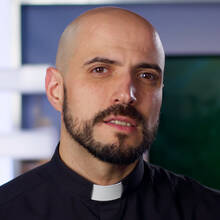A Reflection for Tuesday of the Thirty-third Week in Ordinary Time
Find today’s readings here.
So he ran ahead and climbed a sycamore tree in order to see Jesus,
who was about to pass that way.
When he reached the place, Jesus looked up... (Lk 19:4-5)
The question I’m about to ask you is likely going to be unsettling. The fact that I’ve written, deleted, tried to rewrite in other words and returned to the initial words I first wrote reveals just how discomfiting the question I’m about to pose to you can be. But, it is a question that can unlock a new chapter in your spiritual life. It will also very possibly ruin the image of God you may have formed until now. And for those seasoned Ignatians for whom the question may now be old-hat: Well, this might be a good refresher, restart or return to something you know, but may not practice anymore.
“How does God look at you?”
Uncomfortable?
After listening to people I accompany for spiritual direction berate themselves, often at length and with overwhelming conviction, over all they have done or not done and how unworthy they are to call themselves “Christian,” this question almost always stops them in their tracks. We spend much time thinking and praying to God, saying our usual prayers, but how often do we stop to consider what God sees when God sees me, or hears me, or touches me? (Yes, we’re going there!)
For St. Ignatius Loyola, that is the money question we’re invited to ask God at the start of every prayer period. (See Spiritual Exercises, No. 75).
That is the power of that singular moment of attention; it allows us no excuses, ends delay and procrastination, and provides no escape.
Think about the power of the gaze. Two lovers looking at each other with intentional passion as if the world around them has evaporated. What about that choice time when a parent chooses to look you squarely in the eyes to draw your attention to something you’ve done that has hurt or offended a sibling or stranger, or to say “I love you” when the world around you seems to be crumbling? Both instances are deliberately chosen and have singular significance and strength in the lives of those who experience them. Again, perhaps it is not a gaze, but hearing, touching or sensing that someone is paying attention to you in a particular way at a chosen moment; making you unquestionably aware that all that is important in that moment is the connection between you and them.
The Gospel story of Zacchaeus appears to present such a moment. It is not even clear whether Zacchaeus climbed that tree simply out of curiosity—to see the Jesus everyone had been talking about, as any person might do if they knew a famous person was going to be in town—or if Zacchaeus wanted, in fact, to catch Jesus’ attention, as we might do if we arrive in a crowd and want to signal our presence to the person we are looking for. Whatever it was, we do know from the story that Zacchaeus “was seeking to see who Jesus was,” and was too short in stature to do that from his vantage point so he climbed a tree. Then, at that very moment, when he is enacting the decision to see Jesus, “Jesus looked up and said, ‘Zacchaeus, come down quickly, for today I must stay at your house.’” Some Bible translations, in fact, go further, and add that Jesus not only looked up but that “Jesus looked up, and saw him.” It appears that is all it takes. “And he came down quickly and received him with joy.”
Jesus’ gaze, his purposeful attention to Zacchaeus, appears to have changed Zacchaeus so profoundly that he is filled with joy and cannot delay in his course of action nor continue as he was before, leading Zacchaeus to abandon the material excesses of his life and to pursue a more honest life in service of others.
That is the power of that singular moment of attention; it allows us no excuses, ends delay and procrastination, and provides no escape. When we are able to see ourselves (and others) how God sees us (and them), and to allow ourselves to ask God that question, we see God as God sees us. And if we can learn anything from Zacchaeus, what God sees before Godself is a person God is interested and invested in, who is infinitely more than that person can see that they are.
P.S: If you’re interested in learning more about this point, I heartily recommend reading “Looking at God Looking At You: Ignatius’ Third Addition” by Robert Marsh, S.J., an article that appeared in October 2004 in The Way, the spirituality journal of the Jesuits in Britain.








